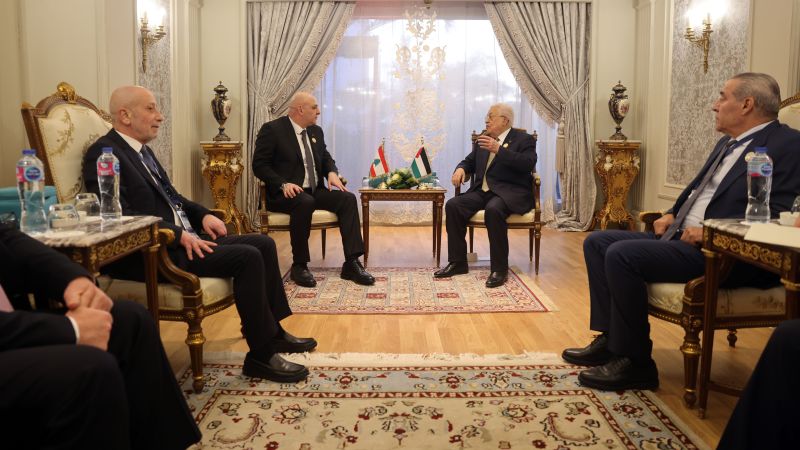

In a significant diplomatic development on Tuesday, Arab leaders collectively endorsed Egypt’s postwar plan for the Gaza Strip. This endorsement comes as a counterproposal to the plan proposed by US President Donald Trump, which envisages the depopulation of the territory and its redevelopment into a beach destination. The Egyptian plan, backed by Arab leaders, instead proposes to allow the approximately 2 million Palestinians currently residing in the Gaza Strip to stay. This plan has emerged amidst an uncertain ceasefire scenario, adding a new dimension to the geopolitical landscape in the region.
Arab Leaders Support Egypt's Postwar PlanArab leaders on Tuesday firmly endorsed Egypt's postwar plan for the Gaza Strip, which would see its roughly 2 million Palestinians able to remain in the territory. This backing is seen as a notable counterproposal to US President Donald Trump's controversial plan to completely depopulate the region and redevelop it into a beach destination. The Arab leaders' endorsement signals a clear deviation from the US's proposed plan, demonstrating a unified front that prioritizes the rights and sovereignty of the Palestinian people.
Details of Egypt's plan have yet to be fully disclosed, but the core aim is to allow Palestinians living in the Gaza Strip to stay, effectively averting the potential humanitarian crisis that could arise from mass displacement. The plan is expected to focus on rebuilding the war-torn area, improving living conditions, and fostering economic growth, without drastically altering the cultural and historical identity of the region.
The endorsement comes at a tense time in the region, with a ceasefire between Israel and Hamas looking increasingly uncertain. Despite this, Arab leaders are united in their support for Egypt's plan, underscoring their commitment to a peaceful resolution that respects the territorial integrity of Palestine.
While this endorsement marks a significant step towards a potential resolution of the Gaza Strip conflict, the situation remains complex. It is clear that any resolution will require the support and cooperation of multiple international players, as well as the Palestinian people themselves.
The Reaction of Arab LeadersArab leaders from across the region, in a unified response, have fervidly endorsed Egypt's proposal. This marks a significant shift in Arab nations' approach to the Palestinian issue, who have traditionally been more fragmented in their responses. The unity in supporting Egypt's plan underscores the widespread opposition to President Trump’s vision for Gaza.
Egypt's plan, which focuses on maintaining the Palestinian population in the Gaza Strip, stands in stark contrast to the US proposal. Trump’s plan has drawn criticism for seemingly aiming to depopulate Gaza and convert it into a beach destination, a move which many Arab leaders have deemed as dismissive of the Palestinian people's rights and historical connection to the land.
The leaders' reaction also highlights the growing influence of Egypt in Arab politics. By rallying support for its postwar plan, Egypt is demonstrating its ability to lead and shape regional policy, particularly in matters concerning Palestine. This could potentially strengthen its international standing and reinforce its role as a key player in the Middle East.
However, it is uncertain how this endorsement will translate into practical steps. The challenge remains to implement this plan amidst the complex political dynamics of the region, and the ongoing instability in Gaza. The ceasefire remains uncertain, and the situation in Gaza continues to be volatile.
International Response to the ProposalsThere has been a mixed response from the international community to both Trump’s Gaza proposal and Egypt’s counter-proposal. According to Dr. Amira Ahmed, a Middle East political analyst, "The Egyptian plan, while beneficial in the short term, may not provide a long-term solution to the underlying issues affecting the Gaza Strip."
Dr. Ahmed further notes, "While the international community appreciates the effort to avoid the mass displacement of Palestinians, it is essential to address the economic and political instability that has long plagued the region. Any plan, whether it is Trump’s or Egypt’s, must consider the long-term sustainability of the Gaza Strip."
While the US has not officially responded to Egypt’s counter-proposal, the State Department spokesperson stated that they are currently reviewing the plan and will work with their partners in the region to ensure any plan respects the dignity and security of the Palestinian people.
Many international bodies and human rights organizations have expressed concern over Trump’s plan, citing the potential for mass displacement and the failure to address the root causes of the conflict. There is also skepticism regarding the feasibility and practicality of transforming the war-torn region into a beach destination.
Final ThoughtsIn a bold move, Arab leaders have stood firmly behind Egypt's postwar plan, going head-to-head with US President Donald Trump's controversial Gaza proposal. Their unanimous endorsement serves as a testament to their commitment to the Palestinian cause and their unwavering belief in the right of the Palestinian people to remain on their ancestral lands.
The counterproposal is a clear message to the United States, emphasizing the collective will of Arab nations to defend the rights of Palestinians. However, with the ceasefire still uncertain, the road to peace remains fraught with tension and conflict. The outcome of this political standoff will undoubtedly have far-reaching implications for the Middle East and beyond.
As the world watches on, the next steps taken by these powerful leaders will shape the future of the Gaza Strip and its people. Regardless of the outcome, the decisions made now will write the next chapter in the long and complex history of this contested region.
Source: https://www.cnn.com/2025/03/04/middleeast/arab-leaders-gaza-counterproposal-intl-latam/index.html
Business & Economy
Jamie brings a wealth of knowledge in financial markets, global trade, and economic trends. From analyzing corporate strategies to breaking down inflation and recession risks, Jamie ensures that you stay informed about how the economy impacts your daily life.